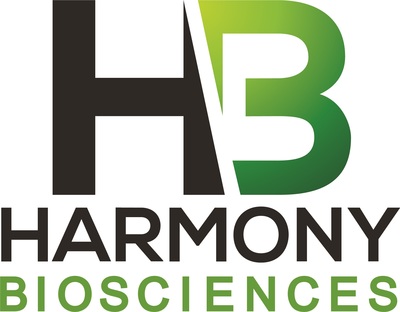Harmony Biosciences Publishes Pitolisant Efficacy Data In CNS Drugs
Harmony Biosciences Holdings, Inc. (Nasdaq: HRMY) announced the publication of a data analysis in CNS Drugs, focusing on the efficacy of pitolisant for treating excessive daytime sleepiness (EDS) and cataplexy in narcolepsy patients. The analysis, derived from two Phase 3 trials, indicates that the response to pitolisant generally begins within the first 2-3 weeks, with significant improvements noted in the Epworth Sleepiness Scale and weekly cataplexy rates. The study reinforces pitolisant's role as an effective treatment option for narcolepsy.
- Publication of efficacy data supporting pitolisant as an effective narcolepsy treatment.
- Response to WAKIX observed as early as 2-3 weeks in some patients.
- Statistically significant improvements in EDS and cataplexy scores noted in clinical trials.
- None.
PLYMOUTH MEETING, Pa., Dec. 13, 2021 /PRNewswire/ -- Harmony Biosciences Holdings, Inc. ("Harmony") (Nasdaq: HRMY), a pharmaceutical company dedicated to developing and commercializing innovative therapies for patients with rare neurological diseases, today announced publication of a data analysis in the December issue of CNS Drugs that evaluates time to onset of response to pitolisant for excessive daytime sleepiness (EDS) and cataplexy in adult patients with narcolepsy.
The publication, Time to Onset of Response to Pitolisant for the Treatment of Excessive Daytime Sleepiness and Cataplexy in Patients with Narcolepsy: An Analysis of Randomized Placebo-Controlled Trials, is also available to view online. The post-hoc analysis evaluates data from HARMONY 1 and HARMONY CTP, two randomized, double-blind, 7-week or 8-week clinical trials of pitolisant where patients were titrated to a potential maximum dose of 35.6 mg/day. Efficacy was assessed by the Epworth Sleepiness Scale (ESS) and weekly rate of cataplexy. Onset of response was defined as the first timepoint of statistical difference between pitolisant and placebo.
"We are pleased to share the results from this post-hoc analysis that sheds light on the time course of response to WAKIX® (pitolisant) based on data from two Phase 3 trials," said Harmony's Chief Medical Officer, Jeffrey Dayno, M.D. "Even though narcolepsy is a chronic disorder, often requiring life-long therapy, both patients and healthcare professionals usually want to know the time to response after initiating treatment, which can help to manage patient expectations. This analysis provides the data to support that response to WAKIX begins in the first few weeks of therapy for some patients while, for others, it may take up to 8 weeks to experience a clinical response. This is also important to know as an adequate treatment trial is often required when managing patients with a chronic disorder like narcolepsy."
This post-hoc analysis included 61 patients from HARMONY 1 (pitolisant, n=31; placebo, n=30) and 105 patients from HARMONY CTP (pitolisant, n=54; placebo, n=51). Onset of response began at week two for HARMONY 1 and week three for HARMONY CTP for the mean change in ESS score. A significantly greater mean change in weekly rate of cataplexy was observed at week two for HARMONY CTP and week five for HARMONY 1 with further improvement observed in pitolisant-treated patients through the end of treatment. The percentage of treatment responders was significantly greater with pitolisant versus placebo beginning at week three for EDS (defined as an ESS score reduction ≥ 3) and week two for cataplexy (defined as a ≥
About WAKIX® (pitolisant) Tablets
WAKIX, a first-in-class medication, is approved by the U.S. Food and Drug Administration for the treatment of excessive daytime sleepiness or cataplexy in adult patients with narcolepsy and has been commercially available in the U.S. since Q4 2019. It was granted orphan drug designation for the treatment of narcolepsy in 2010, and breakthrough therapy designation for the treatment of cataplexy in 2018. WAKIX is a selective histamine 3 (H3) receptor antagonist/inverse agonist. The mechanism of action of WAKIX is unclear; however, its efficacy could be mediated through its activity at H3 receptors, thereby increasing the synthesis and release of histamine, a wake promoting neurotransmitter. WAKIX was designed and developed by Bioprojet (France). Harmony has an exclusive license from Bioprojet to develop, manufacture and commercialize pitolisant in the United States.
Important Safety Information
Contraindications
WAKIX is contraindicated in patients with known hypersensitivity to pitolisant or any component of the formulation. Anaphylaxis has been reported. WAKIX is also contraindicated in patients with severe hepatic impairment.
Warnings and Precautions
WAKIX prolongs the QT interval; avoid use of WAKIX in patients with known QT prolongation or in combination with other drugs known to prolong the QT interval. Avoid use in patients with a history of cardiac arrhythmias, as well as other circumstances that may increase the risk of the occurrence of torsade de pointes or sudden death, including symptomatic bradycardia, hypokalemia or hypomagnesemia, and the presence of congenital prolongation of the QT interval.
The risk of QT prolongation may be greater in patients with hepatic or renal impairment due to higher concentrations of pitolisant; monitor these patients for increased QTc. Dosage modification is recommended in patients with moderate hepatic impairment and moderate or severe renal impairment (see full prescribing information). WAKIX is not recommended in patients with end-stage renal disease (ESRD).
Adverse Reactions
In the placebo-controlled clinical trials conducted in patients with narcolepsy with or without cataplexy, the most common adverse reactions (≥
Drug Interactions
Concomitant administration of WAKIX with strong CYP2D6 inhibitors increases pitolisant exposure by 2.2-fold. Reduce the dose of WAKIX by half.
Concomitant use of WAKIX with strong CYP3A4 inducers decreases exposure of pitolisant by
H1 receptor antagonists that cross the blood-brain barrier may reduce the effectiveness of WAKIX. Patients should avoid centrally acting H1 receptor antagonists.
WAKIX is a borderline/weak inducer of CYP3A4. Therefore, reduced effectiveness of sensitive CYP3A4 substrates may occur when used concomitantly with WAKIX. The effectiveness of hormonal contraceptives may be reduced when used with WAKIX and effectiveness may be reduced for 21 days after discontinuation of therapy.
Use in Specific Populations
WAKIX may reduce the effectiveness of hormonal contraceptives. Patients using hormonal contraception should be advised to use an alternative non-hormonal contraceptive method during treatment with WAKIX and for at least 21 days after discontinuing treatment.
There is a pregnancy exposure registry that monitors pregnancy outcomes in women who are exposed to WAKIX during pregnancy. Patients should be encouraged to enroll in the WAKIX pregnancy registry if they become pregnant. To enroll or obtain information from the registry, patients can call 1-800-833-7460. The safety and effectiveness of WAKIX have not been established in patients less than 18 years of age.
WAKIX is extensively metabolized by the liver. WAKIX is contraindicated in patients with severe hepatic impairment. Dosage adjustment is required in patients with moderate hepatic impairment.
WAKIX is not recommended in patients with end-stage renal disease. Dosage adjustment of WAKIX is recommended in patients with moderate or severe renal impairment.
Dosage reduction is recommended in patients known to be poor CYP2D6 metabolizers; these patients have higher concentrations of WAKIX than normal CYP2D6 metabolizers.
Please see the Full Prescribing Information for WAKIX for more information.
To report suspected adverse reactions, contact Harmony Biosciences at 1-800-833-7460 or FDA at 1-800-FDA-1088 or www.fda.gov/medwatch.
About Harmony Biosciences
Harmony Biosciences is a commercial stage pharmaceutical company headquartered in Plymouth Meeting, PA. The Company was established by Paragon Biosciences, LLC, and is focused on providing novel treatment options for people living with rare neurological diseases who have unmet medical needs. For more information on Harmony, please visit the company's website: www.harmonybiosciences.com.
Forward Looking Statement
This press release contains forward-looking statements within the meaning of the Private Securities Litigation Reform Act of 1995. All statements contained in this press release that do not relate to matters of historical fact should be considered forward-looking statements, including statements regarding our product WAKIX. These statements are neither promises nor guarantees, but involve known and unknown risks, uncertainties and other important factors that may cause our actual results, performance or achievements to be materially different from any future results, performance or achievements expressed or implied by the forward-looking statements, including, but not limited to, the following: our commercialization efforts and strategy for WAKIX; the rate and degree of market acceptance and clinical utility of WAKIX, pitolisant in additional indications, if approved, and any other product candidates we may develop or acquire, if approved; our research and development plans, including our plans to explore the therapeutic potential of pitolisant in additional indications; our ongoing and planned clinical trials; our ability to expand the scope of our license agreement with Bioprojet; the availability of favorable insurance coverage and reimbursement for WAKIX; the impact of the COVID-19 pandemic; the timing of and our ability to obtain regulatory approvals for pitolisant for other indications as well as any other product candidates; our estimates regarding expenses, future revenue, capital requirements and needs for additional financing; our ability to identify additional products or product candidates with significant commercial potential that are consistent with our commercial objectives; our commercialization, marketing and manufacturing capabilities and strategy; significant competition in our industry; our intellectual property position; loss or retirement of key members of management; failure to successfully execute our growth strategy, including any delays in our planned future growth; our failure to maintain effective internal controls; the impact of government laws and regulations; volatility and fluctuations in the price of our common stock; and the significant costs and required management time as a result of operating as a public company; the fact that the price of Harmony's common stock may be volatile and fluctuate substantially; significant costs and required management time as a result of operating as a public company. These and other important factors discussed under the caption "Risk Factors" in our Annual Report on Form 10-K filed with the Securities and Exchange Commission (the "SEC") on March 25, 2021, and our other filings with the SEC could cause actual results to differ materially from those indicated by the forward-looking statements made in this press release. Any such forward-looking statements represent management's estimates as of the date of this press release. While we may elect to update such forward-looking statements at some point in the future, we disclaim any obligation to do so, even if subsequent events cause our views to change.
Harmony Biosciences Media Contact:
Nancy Leone
215-891-6046
nleone@harmonybiosciences.com
Harmony Biosciences Investor Contact:
Patti Bank
ICR Westwicke
415-513-1284
ir@harmonybiosciences.com
![]() View original content to download multimedia:https://www.prnewswire.com/news-releases/harmony-biosciences-publishes-pitolisant-efficacy-data-in-cns-drugs-301442562.html
View original content to download multimedia:https://www.prnewswire.com/news-releases/harmony-biosciences-publishes-pitolisant-efficacy-data-in-cns-drugs-301442562.html
SOURCE Harmony Biosciences
FAQ
What does the recent press release from Harmony Biosciences about HRMY discuss?
What were the key findings of pitolisant usage in the clinical trials mentioned in the HRMY press release?
When was the press release about pitolisant published by Harmony Biosciences?
What is the significance of the publication in <i>CNS Drugs</i> for HRMY investors?






